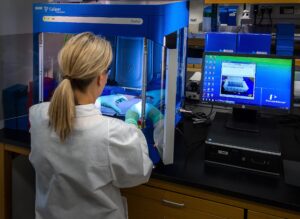
This article aims to delve into the Technological landscape of AI, shedding light on its profound impact and the possibilities it holds for the future.
At its core, AI refers to the development of computer systems that possess human-like intelligence, enabling them to perform tasks that typically require human cognitive abilities. Through the use of algorithms, AI systems can learn from data, recognize patterns, make decisions, and even interact with humans in natural language.
Machine learning, a subset of AI, plays a pivotal role in empowering computers to learn and improve their performance without being explicitly programmed. By analyzing vast amounts of data, machine learning algorithms can identify complex patterns, make accurate predictions, and automate tasks. This ability has opened up unprecedented possibilities across industries.
Natural language processing (NLP) is another critical aspect of AI, allowing computers to understand and respond to human language. With NLP, virtual assistants such as Siri, Google Assistant, and Amazon’s Alexa have become an integral part of our daily lives. These AI-powered companions can answer questions, perform tasks, and even control smart home devices, providing convenience and enhancing productivity.
The technological landscape of AI extends beyond machine learning and NLP. Computer vision is an exciting field within AI that focuses on teaching computers to interpret and analyze visual information. Through advanced algorithms, AI systems can recognize objects, detect faces, and even identify emotions based on visual cues. This has applications in diverse areas, including security systems, autonomous vehicles, and healthcare diagnostics.
The impact of AI on industries is significant and far-reaching. In healthcare, AI has the potential to revolutionize disease diagnosis, drug discovery, and personalized medicine. By analyzing medical images and patient data, AI algorithms can assist doctors in making more accurate diagnoses and predicting patient outcomes. This leads to improved patient care and potentially life-saving interventions.
The financial sector has also embraced AI, utilizing its capabilities for fraud detection, algorithmic trading, and risk assessment. AI algorithms can quickly analyze vast amounts of financial data, identify anomalies, and predict market trends. This enables financial institutions to mitigate risks, streamline operations, and make informed investment decisions.
Manufacturing is another sector where AI has made its mark. AI-powered robotics and automation systems have transformed production lines, improving efficiency, reducing errors, and enhancing product quality. By integrating AI algorithms, robots can perform complex tasks with precision, adapt to changing conditions, and optimize resource allocation. This increases productivity and enables businesses to meet evolving consumer demands.

AI’s impact extends beyond industries to personalized user experiences. Recommendation systems powered by AI algorithms have become integral to online platforms. By analyzing user behavior and preferences, these systems provide tailored suggestions for products, movies, music, and more. This enhances user satisfaction, increases engagement, and drives revenue for businesses.
Ethical considerations are crucial as AI continues to shape our technological landscape. Bias in AI algorithms is a significant concern that needs to be addressed. AI systems must be trained on diverse and representative datasets to avoid perpetuating existing societal biases. Transparency and explain ability are also vital for building trust in AI systems. Users should have a clear understanding of how their data is used and how AI-driven decisions are made.
Looking ahead, the future of AI is filled with immense potential. Advancements in AI research, coupled with increasing computational power, will unlock new possibilities and push the boundaries of innovation. Autonomous vehicles powered by AI are poised to transform transportation, making it safer, more efficient, and environmentally friendly. Healthcare diagnostics will be revolutionized, enabling more accurate and personalized treatments. AI-driven education platforms will provide tailored learning experiences, adapting to individual needs and enhancing accessibility.
the technological landscape of AI is vast and ever-expanding. With its applications in machine learning, natural language processing, computer vision, and more, AI has revolutionized industries, personalized user experiences, and reshaped our future. As we continue to embrace the power of AI, it is imperative to address ethical considerations and ensure responsible development. By doing so, we can unlock the full potential of AI, unleashing a new era of technological innovation and transforming the way we live and work.
The adoption of AI is not without challenges. As AI becomes more prevalent, concerns surrounding privacy, security, and job displacement arise. Safeguarding user data and ensuring robust cyber security measures are of utmost importance to maintain trust and protect sensitive information. Additionally, the fear of job displacement due to automation is a valid concern. However, history has shown that technological advancements often create new opportunities and job roles. Rather than replacing humans, AI has the potential to augment human capabilities and enable individuals to focus on more creative and complex tasks.
Interdisciplinary collaboration and partnerships are crucial for further advancements in AI. The development of AI requires expertise from various domains, including computer science, mathematics, psychology, and ethics. By fostering collaboration among experts from different fields, we can drive innovation, address challenges, and ensure responsible and ethical AI development.
Moreover, ongoing research and development efforts are essential to continuously enhance the capabilities of AI. As technology evolves, AI systems must become more efficient, accurate, and adaptable. Investment in research and the exploration of emerging technologies will drive the next wave of AI advancements, leading to breakthroughs and applications we cannot yet envision.
In conclusion, AI has unleashed a wave of transformative possibilities, revolutionizing industries, enhancing user experiences, and shaping our technological landscape. With its wide-ranging applications and potential for innovation, AI holds the key to solving complex challenges and driving progress in numerous domains. By embracing AI responsibly, fostering collaboration, and investing in research, we can harness its power and unlock a future where AI and human intelligence work in harmony, creating a world of endless possibilities.




